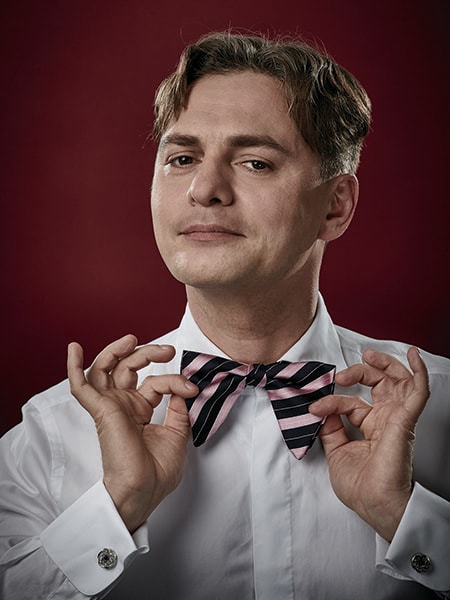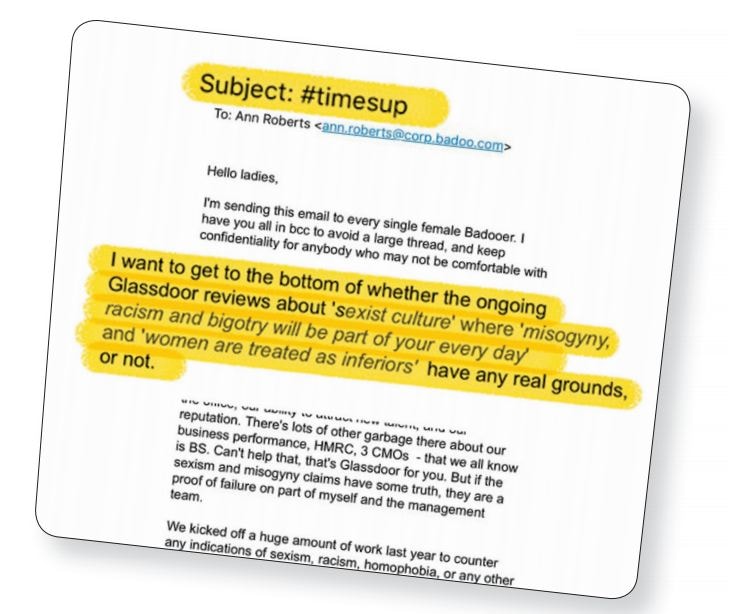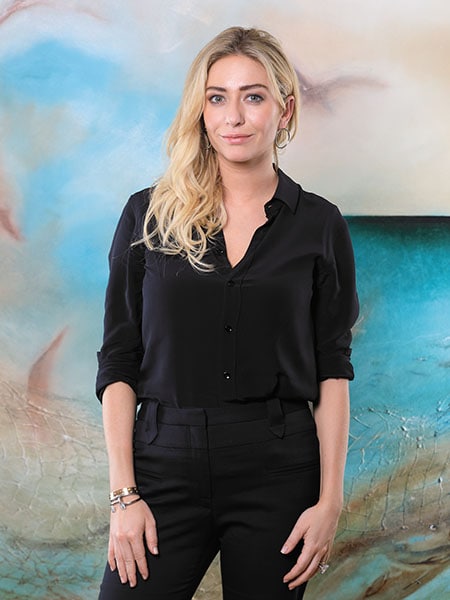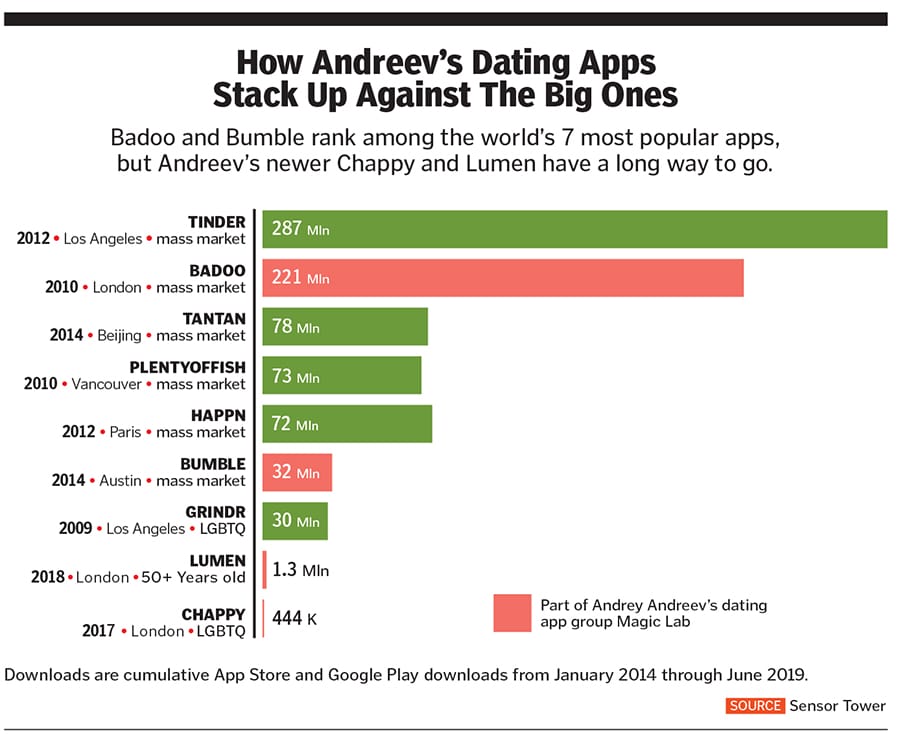
Bumble's sexism problem
The jet-setting Russian billionaire behind the dating app built to empower women oversees a corporate headquarters that more than a dozen former employees allege is toxic, especially for women
 Andrey Andreev at Badoo’s London headquarters in May 2019
Andrey Andreev at Badoo’s London headquarters in May 2019Image: Levon Biss for Forbes
Even for an afternoon business meeting, Andrey Andreev, the world’s top online dating tycoon, dresses like he’s headed to a nightclub: Black jeans, a black bomber jacket and his signature custom-made Prada white T-shirt. “I have hundreds, the world’s biggest collection of Prada white T-shirts,” the 45-year-old says.
As it’s Easter Monday in London, a sleepy bank holiday, our interview expands into a nearly five-hour tour of his favourite restaurants, cafes and tea shops in Covent Garden and Bond Street. We walk through rows of hanging Peking ducks at Novikov restaurant and peruse $66,000 bottles of Burgundy at Hedonism Wines. At the Michelin-starred HIDE, he gestures at a wall made of light oak.
“I want to show you something,” he says, pointing to an easy-to-miss latch. The wall turns out to be a door. Behind it lies another set of doors, made of steel. Those doors yield to a cavernous elevator, large enough to comfortably fit two black SUVs. Andreev steps in. “So you can just drive in from the street and avoid being seen, you see?”
His penchant for hidden things applies to more than his restaurant choice or his preference to avoid the press, which has earned this Russian billionaire (Forbes estimates he’s worth $1.5 billion) a reputation as mysterious and reclusive. Former employees describe a Byzantine corporate structure, revolving around tax avoidance, that encompasses subsidiaries in places ranging from Cyprus to the British Virgin Islands, with strategy meetings in Malta thrown in for good measure. Meanwhile, no fewer than 13 former Badoo workers depict a 600-employee company with a London headquarters that seems clearly toxic, especially for women, including internal engineering updates named after porn stars and a widely circulated video of one employee receiving oral sex from a prostitute.
The irony couldn’t be much more biting. Andreev’s biggest asset is Badoo, a European- and Latin American-focussed dating app that, with 60 million users, stands as one of the world’s largest. His buzziest, however, is Bumble, the dating app focussed on empowering women and giving them a safer environment.
“I understood and I see that we needed to attract women to be on the platform, but how?” Andreev says. “We needed to make a safe place, a place where every woman on the planet [would] feel very comfortable.”
This presents a big problem for Bumble. Whitney Wolfe Herd launched Bumble in one of the great recent feats of corporate revenge. She had previously sued Tinder, where she had been an early executive, for sexual harassment, alleging that her ex-boss and ex-boyfriend sent threats and derogatory text messages, and the company stripped her of a co-founder title. The company denied any wrongdoing. (The suit was quickly and confidentially settled for an amount Forbes reported to be in the neighborhood of $1 million—and, most critically in retrospect, failed to include a noncompete clause.) Within three years, she had replicated Tinder’s historic growth and emerged as one of its strongest competitors.
But Bumble is as much Andreev’s baby as Wolfe Herd’s, and she acknowledges him as her founding partner. It was Andreev who reached out to Wolfe Herd shortly after the lawsuit, suggesting they collaborate. It was Andreev, Wolfe Herd underscores, who pushed for a woman-driven dating app (on Bumble, the woman makes the first move), rather than the social network Wolfe Herd initially proposed. It was Andreev who put up the money, becoming majority owner (he still owns between 59 percent and 79 percent, to Wolfe Herd’s 20 percent). And it was and is Andreev who leveraged Badoo completely so that Bumble could launch into the market with force.
“I don’t think I could have stomached a bunch of men judging me at that time... I could have done a friends-and-family raise and gotten the money,” Wolfe Herd told Forbes in 2017. “This was more about his knowledge and infrastructure.”
Bumble’s titular headquarters may be in Austin, Texas, but the infrastructure, the company’s engine, sits squarely in the London office, which hosts product development and engineering—and a raft of hair-raising allegations.
Wolfe Herd recently dictated a weekly work diary for the New York Times, which called the piece ‘Fighting Misogyny, One Bumble Brand at a Time’.
But according to former Badoo employees, Bumble has a misogyny problem within its own parent company, and her founding partner, with whom she says she speaks between two and five times every day, is right in the middle of it.
*****

Born and raised in Moscow, Andrey Andreev recalls constantly tinkering with his physicist father’s electrical radio components. At 12, he says, he built a crude ham radio that enabled him to have conversations with strangers around the world. His first conversation, during the Cold War, was with someone in the US. “The guy [on the other line] said, ‘I’m from New York,’ and I could not believe it. I thought, ‘You’re joking.’”
He attended the University of Moscow for less than a year before dropping out at 18. The Iron Curtain had recently fallen, and he wanted to see the world. He wound up in Valencia, Spain, building and selling several startups including Virus, an online store that sold computers and computer accessories to Russian users of the nascent internet, and SpyLog, a software tool to track site visitors, for smallish sums.
Then in 2002, he created Begun, a company that helped advertisers target ads online, which caught the attention of Finam Holdings, a Russian investment firm. “At the time, Andreev was not some sort of unknown youngster,” says Finam analyst Leonid Delitsin. “He was already among Russia’s internet heavyweights.” Finam acquired 80 percent of Begun at the end of 2003, a transaction that Andreev says made him a millionaire. He reportedly sold the rest to Finam in 2004.
Finally armed with some wealth, Andreev decided to tackle the burgeoning online dating world. In 2004 he launched Mamba, a bare-bones desktop dating site for Russian users. At the time, Match.com was the world’s biggest online dating service but hadn’t launched in Russia.
Mamba was free but users had an option to pay in order to push their profile to the top of the site. Finam Holdings came knocking again and invested $20 million for a 90 percent stake; Andreev sold the rest to Finam in 2006 for an undisclosed amount.
In 2005, Andreev began spending more time in London, settling in Covent Garden. Building off the success of Mamba, Andreev launched Badoo there in 2006—a year before the launch of the iPhone—with the intent to reach customers in Europe and beyond. (Along the way he obtained citizenship in the UK and Malta.)
From the beginning, Andreev rooted Badoo’s corporate structure in numerous offshore entities. In October 2007, he established Worldwide Vision Ltd, the parent company, in Bermuda, presumably to reduce its tax bill (Andreev denies this and states the company does not comment on its subsidiaries). Worldwide Vision and Andreev then created a dozen subsidiaries in the US, the UK and Cyprus, the majority of which control his four dating apps: Badoo, Bumble, Chappy (a gay dating app launched in 2017) and Lumen (launched last year for the over-50 crowd). In June he created Magic Lab as a holding company for the dating apps.
Andreev at first says board meetings for Worldwide Vision are held in Malta, where the corporate tax rate can be as low as 5 percent, then later says they were in Bermuda. His explanation: Malta is where the company develops intellectual property.
“It’s a fairly common tax avoidance structure,” says Tommaso Faccio, a tax expert at the Independent Commission for the Reform of International Corporate Taxation, a think tank. “Unless there was a tax angle to this, why would you strategise your business through Malta?”
Badoo documents filed with the British government also show yet another entity, Rimberg International Corp, based in the British Virgin Islands (where there is no corporate tax), with Andreev as the ultimate owner. Andreev insists this entity has nothing to do with his dating apps.
“It looks like a mess, but it’s on purpose,” says a former high-ranking executive. “The company does this to evade taxes.” Andreev denies this.
In 2010, Badoo launched its iPhone mobile app, and his idea had finally found the correct tool. The following year, according to a former executive, the company went from 20 million user sign-ups to 100 million in four months, mostly in Europe and Latin America, and notched $200 million in revenue. (Forbes estimates that last year Badoo had a bit over $300 million in revenue.)
While Match.com required members to pay for a monthly subscription (starting at $34.99 in 2010), sign-up on Badoo has always been free to see and message other users; it was an in-app purchase pioneer, charging users for premium features, like paying a dollar, a euro or a pound to bump a profile to the top of search lists or messaging more than 10 users. “Back then...you didn’t really need money,” says Andreev. “You could just create a product and it would go ballistic.”
*****
 Isle talk: Whitney Wolfe Herd and Andrey Andreev came up with Bumble’s signature feature—of letting women make the first move—over drinks in Mykonos, Greece
Isle talk: Whitney Wolfe Herd and Andrey Andreev came up with Bumble’s signature feature—of letting women make the first move—over drinks in Mykonos, GreeceImage: Mexy Xavier
Simultaneous with this growth, Badoo began earning a reputation for wild parties. One former employee recalls seeing photos of a gathering at a person’s house, encompassing “half the company”. “Everyone was naked and doing lines of coke, and they were sending these photos over the internal email system.” Bacchanalia, then captured in photos and videos and shared via an internal email list dedicated to “non-work, party stuff”, became a regular occurrence, says the former employee. A private Facebook group of about 200 Badoo alumni also contains references to the gatherings.
“I wonder if current Badoo’rs know of the afterparties with prostitutes [sic] and cocaine in all their offices,” reads one message in the group.
“I miss the days of Ketamine infused afterparties in Badoo,” writes another former Badoo employee.
By all accounts, Andreev did not go to these parties or participate in the email listserv, but he was aware of it, says a former engineer who worked closely with Andreev, and allowed the listserv to go on, despite objections from newly arrived executives. The email listserv was eventually shut down in September 2011. Andreev denies having knowledge of it. More concerning, several former employees say office behavior was hostile and discriminatory toward women.
“While serving as the company’s CMO, I was told to act pretty for investors and make job candidates ‘horny’ to work for Badoo,” Jessica Powell, Badoo’s chief marketing officer from 2011 to 2012 says in an email. “I was once even asked to give a designer candidate a massage.” She says she refused to do so, adding that “female employees were routinely discussed in terms of their appearance.”
“When female staff spoke up, their concerns were ignored or minimised,” she adds, decrying a “misogynistic atmosphere.”
“Disagree with Andrey? You were called a ‘cyka’ [bitch in Russian],” writes Powell.
Badoo’s boorish work culture helped inspire Powell to write The Big Disruption, a satirical novel published this past April. In an essay on the website Medium introducing the book, she mentions having worked for Andreev, who “asked me whether we should hand out dildos as company swag or consider converting our social media platform into an anonymous sex club. (We even whiteboarded it).” Andreev counters, “There are many ways to promote a fictional book in order to attract attention, and Jessica is a very talented marketing professional.”
“In order to progress in that company, employees (and particularly female ones) were expected to see their jobs as primarily massaging the egos of the founder and senior managers who held influence with him,” adds employee Alice Bonasio, Badoo’s director of communications and public relations manager from 2011 to 2012, by email. She says she was fired because she did not fit well with Badoo’s “patriarchal” environment. “The culture meant that for female employees to get ahead, they needed to heavily ‘play the game.’”
Playing the game, in one case, meant watching a video of an employee receiving oral sex from a prostitute. Four former employees mentioned knowledge of this video—and one of them says she watched it at the urging of co-workers. A spokesperson for Badoo dismisses the idea that a video existed.
While Badoo’s popularity grew in Europe and Latin America in the early 2010s, adoption was slow in the US. The American user base then was mostly Latino. Andreev would complain when he saw too many dark faces on the app—he believed it lowered the value of the brand and made it look cheap, says a former employee who worked on marketing campaigns. “Andrey was always making it clear that white was better,” says the former high-ranking executive. “If someone were to arrive a little bit late to the office and they were Latino or African, he would make comments like, ‘Well, what can you expect,’ as if people who were not white were not hardworking.” Andreev denies this: “Diversity is at the core of our brands and values.”
While many of the most egregious stories stem from the company’s early, hypergrowth period, a string of incidents last year point to ongoing issues. According to two employees who left recently, Andreev wanted to hire only young, attractive women for marketing and administrative roles. “I remember there was one [job] candidate, and Andrey said, ‘No, she’s fat. Can you imagine her speaking to the press and being the face of Badoo?’” says a former employee. Again, Andreev denies this.
In another instance in July 2018, a female employee accused a male employee of inappropriate touching during a summer company party at Queen’s House, a former royal residence turned into a museum and event venue. The male employee was fired as a result. He appealed and, shortly after, in an email sent to the executive team (including Andreev and Wolfe Herd), the HR department reversed its decision. A spokesperson for Badoo says that the company hired an external human resources consulting firm, which concluded that the termination had been too harsh. According to a former employee, the explanation given in the email from HR was that the man was excused from his behavior in part because he was intoxicated. The male employee was reinstated but moved to a different floor after the female employee said she did not want regular interaction with him.
In March this year, a female employee accused a male employee of bullying and harassment. Badoo again hired the external firm to launch an investigation. The accused employee was suspended during the investigation, which took three and a half weeks. He got a written warning, according to the company. “People were pissed off that he was allowed to come back,” says a former worker.
Andreev, who recently called Forbes from Turin, Italy, where he’s filming a cameo in the third Kingsman movie, a British-American franchise about a spy organisation, says his company engaged in a process for these cases designed to be fair to both the accusers and the accused. “I stand behind the process integrity and outcome of each,” he says. “You have been misinformed about the circumstances on both, and I have thorough documentation for this. As any HR matters are sensitive and confidential, I cannot give you more details.”
*****
Not surprisingly, Badoo has seen large turnover at the executive level: This decade, only three of 11 C-suite execs Forbes found on LinkedIn lasted for more than 16 months. Over the past year, however, Andreev has made some changes to address issues raised here. He put an end to the use of porn-star nomenclature in June 2018, and he sent a letter to Badoo employees last November declaring that discrimination in the workplace would not be tolerated.

In January, in response to Glassdoor reviews that said sexism, racism and bigotry were a big part of everyday life at Badoo, the company sent a survey to female employees in the London office asking if they had experienced or witnessed workplace discrimination. Several former Badoo employees said that the culture has slowly been improving in London, with new diversity and inclusion training as well as increased maternity leave.
Andreev maintains that he is a collaborator and unifier, not racist or sexist as others allege, and that his apps are connecting more and more people around the world. “We support women, different age groups, groups with different sexual preferences,” Andreev says. “We have collected so much data that it’s a clear understanding: It is no longer just a business. It’s a social responsibility.”
He’s parroting Bumble’s line—the corporate connection that makes these allegations that much more hypocritical and explosive. Not only does Andreev own the majority of a woman-empowering dating tool, but that tool is intertwined with a burgeoning woman-centric Bumble mini-empire that encompasses a networking app, a venture capital fund backed by Serena Williams that primarily invests in female founders, a forthcoming skin care line, and an initiative that doles out grants to filmmakers. Forbes has reported that revenues for Bumble grew to nearly $180 million in 2018.
Wolfe Herd, who spent Bumble’s formative period walking around London with Andreev for days, flying to London from Texas around 15 times just in the four months after she settled her lawsuit with Tinder, tells Forbes that she has never witnessed toxic behavior in the Badoo headquarters. And she stands firmly behind Andreev. “He’s become my family and one of my best friends.”
She adds: “What I’ve seen firsthand from Andrey is creative and motivating behavior. Andrey has never been anything but kind and respectful to me.”
He’s also helped make her wealthy, with a net worth Forbes estimates at more than $300 million. With the Chappy and Lumen apps, Andreev’s engineering force continues to leverage the engineering team centralised in the London office and all the thousands of lines of code and A/B tests it has developed: If a feature works well on one app, it can easily be incorporated and turned on in another app, and so on. But former employees also question the dynamic when America’s second-most-used dating app, Bumble, isn’t much more than a marketing and strategy arm.
“As Bumble grew and grew, you wonder why they didn’t relook at that business relationship and set it up so that engineers and more product people were also in the Austin office,” a former employee says. “There’s a power play of who wants to control the product.”
Besides requiring Andreev’s buy-in, independence would be difficult and costly. Wolfe Herd would need to recruit and train an entire engineering team, establish data centres and build a new infrastructure for the app. “The whole effort would likely take more than a year, cost over $10 million and still would have significant chances of failing,” says Gene Sokolov, former head of engineering at Badoo from 2011 to 2014.
The conclusion of one recently departed engineering manager: “There’s really no way out.”
(This story appears in the 30 November, -0001 issue of Forbes India. To visit our Archives, click here.)




